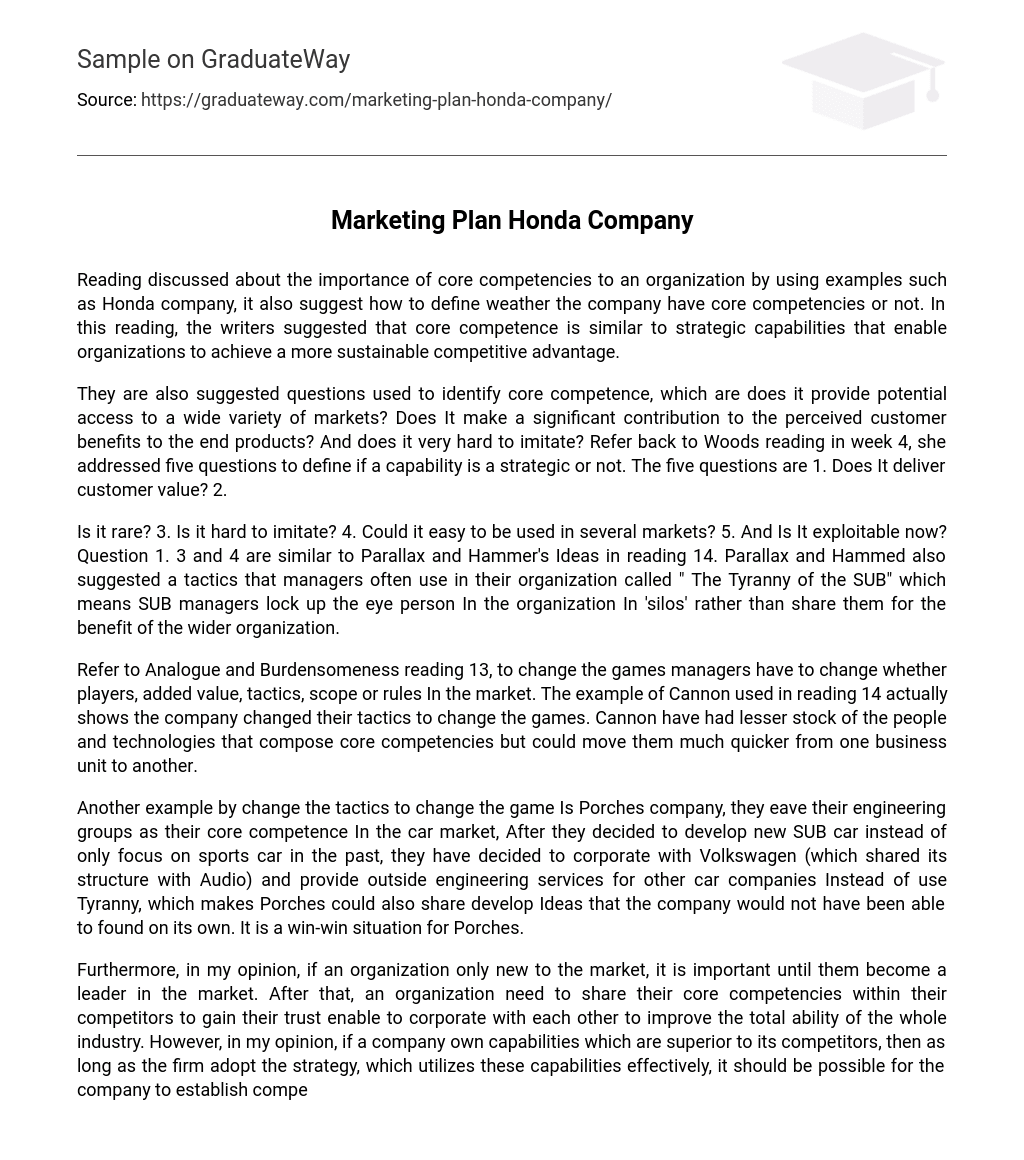Reading discussed about the importance of core competencies to an organization by using examples such as Honda company, it also suggest how to define weather the company have core competencies or not. In this reading, the writers suggested that core competence is similar to strategic capabilities that enable organizations to achieve a more sustainable competitive advantage.
They are also suggested questions used to identify core competence, which are does it provide potential access to a wide variety of markets? Does It make a significant contribution to the perceived customer benefits to the end products? And does it very hard to imitate? Refer back to Woods reading in week 4, she addressed five questions to define if a capability is a strategic or not. The five questions are 1. Does It deliver customer value? 2.
Is it rare? 3. Is it hard to imitate? 4. Could it easy to be used in several markets? 5. And Is It exploitable now? Question 1. 3 and 4 are similar to Parallax and Hammer’s Ideas in reading 14. Parallax and Hammed also suggested a tactics that managers often use in their organization called ” The Tyranny of the SUB” which means SUB managers lock up the eye person In the organization In ‘silos’ rather than share them for the benefit of the wider organization.
Refer to Analogue and Burdensomeness reading 13, to change the games managers have to change whether players, added value, tactics, scope or rules In the market. The example of Cannon used in reading 14 actually shows the company changed their tactics to change the games. Cannon have had lesser stock of the people and technologies that compose core competencies but could move them much quicker from one business unit to another.
Another example by change the tactics to change the game Is Porches company, they eave their engineering groups as their core competence In the car market, After they decided to develop new SUB car instead of only focus on sports car in the past, they have decided to corporate with Volkswagen (which shared its structure with Audio) and provide outside engineering services for other car companies Instead of use Tyranny, which makes Porches could also share develop Ideas that the company would not have been able to found on its own. It is a win-win situation for Porches.
Furthermore, in my opinion, if an organization only new to the market, it is important until them become a leader in the market. After that, an organization need to share their core competencies within their competitors to gain their trust enable to corporate with each other to improve the total ability of the whole industry. However, in my opinion, if a company own capabilities which are superior to its competitors, then as long as the firm adopt the strategy, which utilizes these capabilities effectively, it should be possible for the company to establish competitive advantages.
In Analogue and Burdensomeness reading (reading 13) there are two types of games to be mentioned, the first one is Rule based games which is there is a reaction to very action in the market, the second one is freewheeling games which is each player contributes to the way it is played. And when they leave the game changes. Parallax and Hammed suggested that core competencies are communication, involvement, and a deep commitment to working across organizational boundaries. It involves many levels of people and all functions, World-class research in.
The skills that together constitute core competence must coalesce around individuals whose efforts are not so narrowly focused that they cannot recognize the opportunities for lending their functional expertise with those of others on new and interesting ways. In my opinion, Core competencies more likely to be seen as a freewheeling games where each individual organizations plays with each other, they cannot live without each other, even a little bit movement can change the rules within the market.
The difference between reading 13 and 14 is reading 13 is more focus on shaping the game you play, not Just playing the game you find. In parallax reading, if we seen core competencies as an organization’s Weapon’ towards their competitors, Parallax ND Hammed suggested that organizations better to keep the Weapon’ the way it is than rebuild the Weapon’. Link to previous readings: Holey, Saunders and Pierce Reading ‘ Marketing Strategy and competitive Positioning introduced the analysis of Growth Share Matrix and SUB, which will support the background of reading 14.
Change the mindset: train and inform managers that people in Subs who are critical to core competencies are corporate assets to be deployed for the benefit of the wider organization (Parallax & Hammed) refer to Moss-Canter’s reading in week 2 that successful strategy needs to focus on human and social factors. In my opinion, Core competencies also can help an organization driving markets. Because of it is hard to imitate.
This point refers to Gasworks, Kohl and Sashays “Market Driven Vs. Driving Markets” in reading 11. Reading 14 related to previous course: augmented product) will help us understand more about core competence especially ‘ from core competencies to core products’ part. Principle of management: introduced basically knowledge about Growth Share Matrix and SIBS (Strategy business unit) will support in this reading since it mentioned a lot about SUB. It is easy to get lost in this reading without knowing such about SUB.





